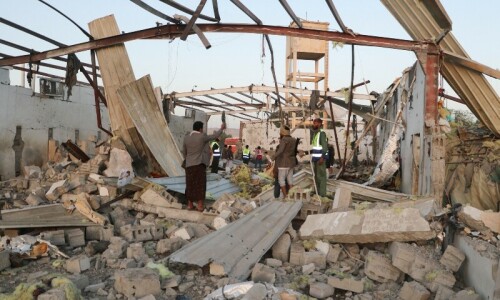ISLAMABAD: The Asian Development Bank says the livability of cities in Pakistan is decreasing, and urban centres in the country are becoming increasingly inefficient, scoring low on multiple competitiveness indexes, with congestion, unattractiveness and pollution.
In an urban development analysis incorporated in the “Pakistan National Urban Assessment Report”, launched on Monday, the ADB pointed out that most urban centres lack a designated downtown area to host and encourage economic, social and cultural activities. The few green spaces in urban centres are disappearing, while any greening projects tend to be concentrated in affluent areas.
It further pointed out that public space has been continuously shrinking with the increased sale of public property prompted by the high commercial value of urban land and the growing financial needs of urban authorities, aided by the politician-developer nexus.
Introducing the report, ADB Country Director Emma Xiaoqin Fan said that Pakistan’s rapid urban population growth is multiplying the urbanisation challenges. The pressure on cities mired in ever-increasing deficits of urban infrastructure and services will only intensify, with an urban population projected to climb to 99 million, or 40 per cent of the country’s total, in 2030, she said.
Says rapid population growth is multiplying urbanisation challenges
She said ADB will continue supporting balanced urbanisation by developing climate-resilient infrastructure to enhance the delivery of high-quality integrated municipal services in intermediate cities.
The analysis pointed out that without a responsible and capable coordinating municipal authority, the fragmentation of land use planning and management across multiple siloed organisations with ambiguous and overlapping functions fails to deliver a cohesive bundle of social and economic opportunities for urban citizens.
The report recommended that with cities in the country preparing new master plans or updating the existing ones, there is an opportunity to direct land use and management towards more sustainable pathways. Forging a common understanding and the political will to address the drivers that control access to land is an essential first step.
While urban centres in Pakistan face similar development challenges, the report says there are fundamental differences in urbanisation issues between the four provinces and major cities. The population of Karachi almost doubled over the past two decades leading to 2022, while that of Lahore rose by 138 per cent.
The demographic pressure on these two cities needs to be eased by developing alternative urban centres and improving the socioeconomic opportunities and living conditions in rural areas, suggests the report.
KARACHI
The report assessed that class division is a major problem in Karachi since most of the elite live in cantonment areas or private housing societies, while those on low incomes have been pushed to the city’s largest district, Karachi
East. The city is further divided along religious and ethnic lines, which has led to several outbreaks of violence in the past. Karachi is the only city in Pakistan that, to some degree, is expanding vertically due to limited land and urgent housing needs, it says.
LAHORE
Uncontrollable sprawl is the main challenge facing Lahore. The city is quickly absorbing surrounding agricultural fields through numerous uncoordinated housing schemes and with little central planning. Many developments are illegal and there is no mechanism to report and stop early construction. The city missed an opportunity to set its newly constructed Ring Road as a boundary and transform it into an economic corridor, adding value to the local economy.
PESHAWAR
The demographic pressure in Peshawar has intensified with the merger of KP and the federally administered tribal areas, precipitating significant migration from these areas to Peshawar, resulting in doubling the population between 1998 and 2017. The KP Urban Policy 2030, adopted in early 2023, now guides the development of Peshawar. The city’s infrastructure is improving, and the operationalisation of the first BRT line in 2020 has eased traffic and boosted urban mobility.
QUETTA
While Quetta is directly threatened by climate change, it receives limited support from international organisations, and there is no collaboration with other provinces to transfer knowledge. Private investment also remains limited and no public-private partnership projects are planned.
ISLAMABAD
Although designed as a low-rise, low-density city, Islamabad — the federal capital — is under constant pressure to deviate from the plan due to mounting housing demand. Like Pakistan’s other major cities, the main problem in Islamabad is institutional. Instead of cooperating under a central metropolitan authority, agencies act as rivals and struggle for power.
Lead author of the report, Prof Spiro N Pollalis, in his detailed presentation and observation, said that Pakistan is at a critical juncture, with urban aggregation, arguably the key driver of economic and social development, is challenged by failing public services, declining quality of life, and flagging economic productivity.
Published in Dawn, October 22th, 2024














































